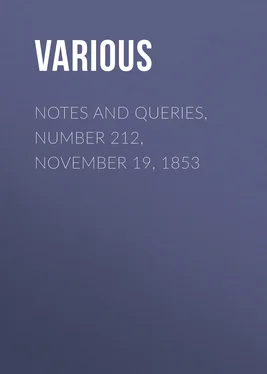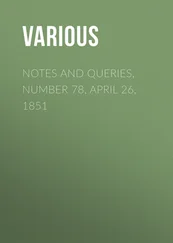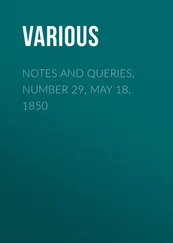Various - Notes and Queries, Number 212, November 19, 1853
Здесь есть возможность читать онлайн «Various - Notes and Queries, Number 212, November 19, 1853» — ознакомительный отрывок электронной книги совершенно бесплатно, а после прочтения отрывка купить полную версию. В некоторых случаях можно слушать аудио, скачать через торрент в формате fb2 и присутствует краткое содержание. Жанр: foreign_antique, periodic, foreign_edu, на английском языке. Описание произведения, (предисловие) а так же отзывы посетителей доступны на портале библиотеки ЛибКат.
- Название:Notes and Queries, Number 212, November 19, 1853
- Автор:
- Жанр:
- Год:неизвестен
- ISBN:нет данных
- Рейтинг книги:4 / 5. Голосов: 1
-
Избранное:Добавить в избранное
- Отзывы:
-
Ваша оценка:
- 80
- 1
- 2
- 3
- 4
- 5
Notes and Queries, Number 212, November 19, 1853: краткое содержание, описание и аннотация
Предлагаем к чтению аннотацию, описание, краткое содержание или предисловие (зависит от того, что написал сам автор книги «Notes and Queries, Number 212, November 19, 1853»). Если вы не нашли необходимую информацию о книге — напишите в комментариях, мы постараемся отыскать её.
Notes and Queries, Number 212, November 19, 1853 — читать онлайн ознакомительный отрывок
Ниже представлен текст книги, разбитый по страницам. Система сохранения места последней прочитанной страницы, позволяет с удобством читать онлайн бесплатно книгу «Notes and Queries, Number 212, November 19, 1853», без необходимости каждый раз заново искать на чём Вы остановились. Поставьте закладку, и сможете в любой момент перейти на страницу, на которой закончили чтение.
Интервал:
Закладка:
It would be easy to multiply passages in which this simile occurs; but what I have given is suffcient for my purpose, and I must leave room for "The Trojan Horse." 4 4 See Grey's Hudibras , Dublin, 1744, vol. ii. p. 248., vol. i. pp. 150, 151., where allusions both to "The Trojan Mare" and tying "the fox tails together" occur. Butler was versed in the controversies of his day, and, moreover, loved to satirise the metaphor mania by his exquisitely comic similes.
I must content myself with giving the title of the following work, as I have never met with the book itself: The Trojan Horse, or The Presbyterian Government Unbowelled , London, 1646.
In a brochure of Primate Bramhall's, entitled
"A Faire Warning for England to take heed of the Presbyterian Government.... Also the Sinfulnesse and Wickednesse of the Covenant , to introduce that Government upon the Church of England."
the second paragraph of the first page proceeds:
"But to see those very men who plead so vehemently against all kinds of tyranny, attempt to obtrude their own dreames not only upon their fellow-subjects, but upon their sovereigne himself, contrary to the dictates of his own conscience, contrary to all law of God and man; yea to compell forreigne churches to dance after their pipe, to worship that counterfeit image which they feign to have fallen down from Jupiter, and by force of arms to turne their neighbours out of a possession of above 1400 years, to make roome for their Trojan Horse of ecclesiastical discipline (a practice never justified in the world but either by the Turk or by the Pope): this put us upon the defensive part. They must not think that other men are so cowed or grown so tame, as to stand still blowing of their noses, whilst they bridle them and ride them at their pleasure. It is time to let the world see that this discipline which they so much adore, is the very quintessence of refined Popery ."
My copy of this tract has no place or date: but it appears to have been printed at the Hague in 1649. It was answered in the same year by "Robert Baylie, minister at Glasgow," whose reply was "printed at Delph."
As the tide of the time and circumstance rolled on, this simile gained additional force and depth; and to understand the admirable aptitude of its application in the passage I shall next quote, a few preliminary remarks are necessary.
There was always in the Church of England a portion of her members who could not forget that the Puritans, though external to her communion, were yet fellow Protestants; that they differed not in kind, but in degree—and that these differences were insignificant compared with those of Rome. At the same time, they reflected that perhaps the Church of England was not exactly in the middle, and that she would not lose were she to move a little nearer the Puritan side. Accordingly, various attempts were made to enlarge the terms of her communion, and eject from her service-book any lingering "relics of Popery" which might offend the weaker brethren yclept the Puritans: thus to make a grand Comprehension Creed—a Church to include all Protestants.
This was tried in James I.'s reign at the Savoy Conference; but in spite of Baxter's strenuous efforts and model prayer-book, it was a failure. Even Archbishop Sancroft was led to attempt a similar Comprehensive Scheme, so terrified was he at the dominance of the Roman Church in the Second James's reign: however, William's accession, and his becoming a nonjuror, crossed his design. In 1689, Tillotson, Burnet, and a number of William's "Latitudinarian" clergy made a bold push for it. A Comprehension Bill actually passed the House of Lords, but was thrown out by the Commons and Convocation. From William's time toleration and encouragement were extended to all save "Popish Recusants;" so that there were a large number in the Church of England ready to assist their comrades outside in breaking down her fences. The High Churchmen, however, as may be guessed, would not sit tamely by, and see the leading idea of the Anglican Church thrown to the winds, her via media profaned, her park made a common, and her distinctive doctrines and fences levelled to the ground. What their feelings were, may be gathered from this indignant invective:
"The most of the inconveniences we labour under to this day, owe their original to the weakness of some and to the cowardice of others of the clergy. For had they stood stiff and inflexible at first against the encroachments and intrigues of a Puritanical faction, like a threefold cord, we could not have been so easily shattered and broken. The dissenters, as well skilled in the art of war, have besieged the Church in form: and at all periods and seasons have raised their batteries, and carried on their saps and counter-scarps against her. They have left no means unessayed or practised, to weaken her. And when open violence has been baffled, and useless, stratagem and contrivance have supplied what force could never effect. Hence it is, that under the cant of conscience and scruple , they have feigned a compliance of embracing her communion; if such and such ceremonies and rules that then stood in force could be omitted, or connived at: and having once broke ground on her discipline, they have continued to carry on their trenches, and had almost brought the Great Comprehension-Horse within our walls; whilst the complying , or the moderate clergy (as they are called), like the infatuated Trojans , helped forward the unwieldy machine ; nor were they aware of the danger and destruction that might have issued out of him."— The Entertainer , London, 1718, p. 153. 5 5 Let any one interested in the history of Comprehension refer to the proceedings relative to the formation of the "Evangelical Alliance." Jeremy Collier gives a curious parallel:—"Lord Burleigh, upon some complaint against the Liturgy, bade the Dissenters draw up another, and contrive the offices in such a form as might give general satisfaction to their brethren. Upon this overture the first classis struck out their lines, and drew mostly by the portrait of Geneva. This draught was referred to the consideration of a second classis, who made no less than six hundred exceptions to it. The third classis quarrelled with the corrections of the second, and declared for a new model. The fourth refined no less upon the third. The treasurer advised all these reviews, and different committees, on purpose to break their measures and silence their clamours against the Church. However, since they could not come to any agreement in a form for divine service, he had a handsome opportunity for a release: for now they could not decently importune him any farther. To part smoothly with them, he assured their agents that, when they came to any unanimous resolve upon the matter before them, they might expect his friendship, and that he should be ready to bring their scheme to a settlement." Collier's Hist. , vol. viii. p. 16. See Cardwell's Hist. of the Conference connected with the Revision of the Book of Common Prayer , London, 1849, 8vo. See also Quarterly Review , vol. 1. pp. 508-561., No. C. Jan. 1834. The present American Prayer Book is formed on the Comprehension scheme. Last year Pickering published a Book of Common Prayer of the Church of England, adapted for General Use in other Protestant Churches , which is well worth referring to. Those who wished to "comprehend" at the Roman side of the via media were very few. Elizabeth and Laud are the most prominent instances. Charles I., and afterwards the Nonjurors, had schemes of communion with the Greek Church. A History of Comprehension would involve a historical notice of the Thirty-nine Articles, and the plan of Comprehension maintained by some to be the intention of their framers. It should include also distinctive sketches of the classes formerly denominated Church Papists and Church Puritans .
Интервал:
Закладка:
Похожие книги на «Notes and Queries, Number 212, November 19, 1853»
Представляем Вашему вниманию похожие книги на «Notes and Queries, Number 212, November 19, 1853» списком для выбора. Мы отобрали схожую по названию и смыслу литературу в надежде предоставить читателям больше вариантов отыскать новые, интересные, ещё непрочитанные произведения.
Обсуждение, отзывы о книге «Notes and Queries, Number 212, November 19, 1853» и просто собственные мнения читателей. Оставьте ваши комментарии, напишите, что Вы думаете о произведении, его смысле или главных героях. Укажите что конкретно понравилось, а что нет, и почему Вы так считаете.












